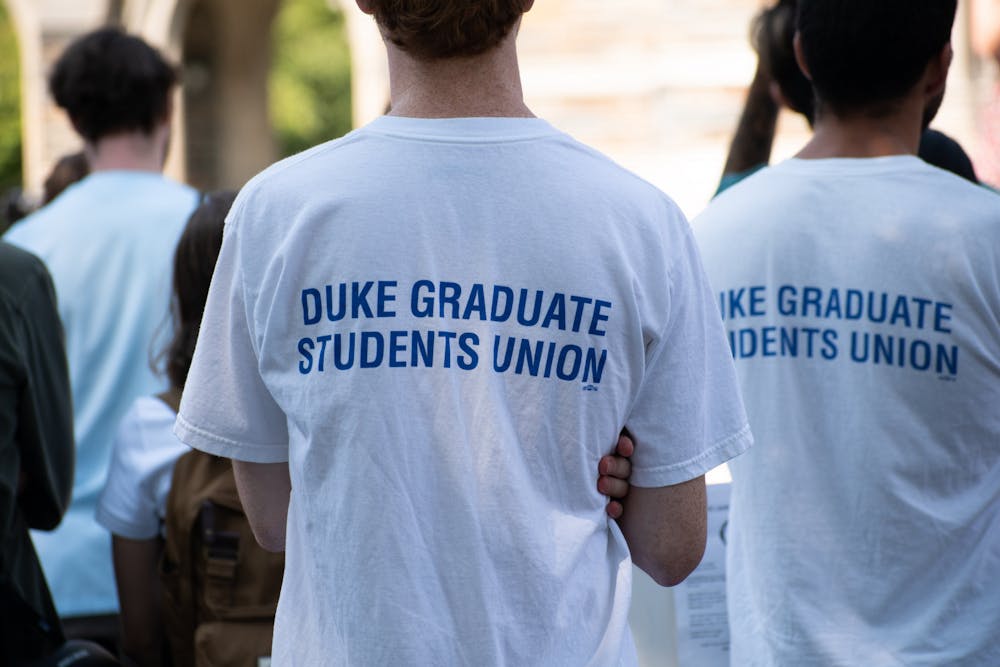Duke is looking to challenge a 2016 National Labor Relations Board decision that affirms the legal right for graduate students to unionize as employees. Since the Duke Graduate Students Union filed for legal certification last week, the University has maintained that graduate students are not employees and that it does not support their unionization efforts.
In 2016, the NLRB ruled 3-1 that graduate students at Columbia University are employees with the right to collective bargaining.
“Duke will seek to present evidence demonstrating that its graduate students in their academic programs are not employees, and that the NLRB's 2016 reasoning was incorrect,” wrote Chris Simmons, interim vice president for public affairs and government relations, in a statement to The Chronicle.
Simmons echoed a similar sentiment to interim Provost Jennifer Francis’ Monday email to doctoral students and faculty that came out against the union. Duke views its relationship with graduate students as centered on education, training and mentorship, which is “fundamentally different from that of employer to employee.”
“Our Ph.D. students are not admitted to do a job; they are selected because of their potential to be exceptional scholars,” Simmons wrote. He added that Duke sees the “significant financial and programmatic support for Ph.D. students to help them reach their academic goals” as “very different from an employment relationship.”
Matthew Thomas, DGSU co-chair and a third-year doctoral candidate in the English department, called Duke’s statement a “shocking public position to take.” He said that while the “immediate result ... is to delay our election,” Duke’s statement comes out against other unions nationwide and on campus.
“In effect, Duke is saying that all the grad wins that have happened since 2016 should be rolled back and that they shouldn’t exist,” said Thomas. “It flies in the face of the reality of the situation ... It’s an inability to look around and see that this is the future of higher education.”
Thomas said Duke’s statement is particularly shocking because “we’ve explicitly stated that we want to work together, that we’re ready to sit down at the bargaining table and we’re ready to have a productive exchange.”
“They’re just like, nope,” he said. “And they just hit the nuclear button.”
In the past week, multiple groups, including the Duke Graduate and Professional Students Government, responded to Duke administration’s Monday email with calls for Duke to remain “neutral” during the union authorization campaign.
If successful, DGSU would be the first employer-recognized graduate student union at a private university in the South. Improvements the union hopes for include inflation-responsive living wage, affordable childcare and increased support for international students.
“We're giving Duke every chance along the way to work with us. And we intend to win and we intend to sit down at the bargaining table and work with them. So why not just start now?” Thomas said.
History of NLRB decisions on graduate students
Historically the NLRB has gone back and forth on its stance on the role of students who teach or research at a private university. Since the passage of the National Labor Relations Act in 1935, students have been considered employees under the NLRA from 2000 to 2004 and from 2016 to present, according to the NLRB fact sheet.
In 2000, the board decided a case in favor of graduate students at New York University, stating that they were “statutory employees.” In 2004, it changed its stance again, ruling against graduate teaching assistants looking to unionize at Brown University. And then in 2016, it ruled in favor of Columbia’s graduate students.
In his statement, Simmons cited the passage of U.S. labor law in 1935. During the majority of that time, graduate assistants have been classified primarily as students, not as employees allowed to unionize, he wrote.
The 2016 National Labor Relations Board decision that Columbia graduate students were employees was based on the “specific facts” at Columbia, according to Simmons. However, a court of law did not review this decision, he wrote.
Get The Chronicle straight to your inbox
Signup for our weekly newsletter. Cancel at any time.

Milla Surjadi is a Trinity junior and a diversity, equity and inclusion coordinator of The Chronicle's 119th volume. She was previously editor-in-chief for Volume 118.

Katie Tan is a Trinity senior and digital strategy director of The Chronicle's 119th volume. She was previously managing editor for Volume 118.

